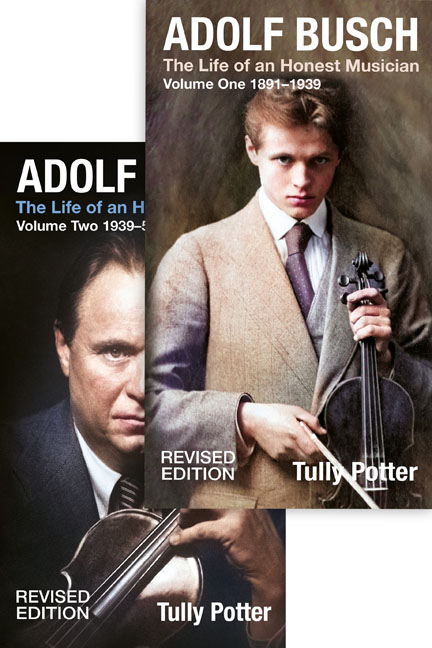Book contents
- Frontmatter
- Contents
- Illustrations
- Dedication
- Introduction
- Acknowledgements
- I The Busch Family
- II The Prodigy
- III The Cologne Conservatory
- IV The Young Virtuoso
- V The Vienna Years
- VI Berlin and Busoni
- VII The Darmstadt Days
- VIII Burgeoning in Basel
- IX The Break
- X Busch the Man
- XI The Chamber Players
- XII The Lucerne Festival
- Volume Two: 1939–52
- XIII The New World
- XIV Between Two Continents
- XV The Marlboro School of Music
- Appendices
- Envoi: Erik Chisholm talks about Adolf Busch
- Select Bibliography
- Index to Discography
- Index of Busch’s Compositions
- General Index
- Index to Adolf Busch’s Compositions on Record
- Index to Discography
8 - The Art of Ensemble Playing, by Adolf Busch
Published online by Cambridge University Press: 28 May 2024
- Frontmatter
- Contents
- Illustrations
- Dedication
- Introduction
- Acknowledgements
- I The Busch Family
- II The Prodigy
- III The Cologne Conservatory
- IV The Young Virtuoso
- V The Vienna Years
- VI Berlin and Busoni
- VII The Darmstadt Days
- VIII Burgeoning in Basel
- IX The Break
- X Busch the Man
- XI The Chamber Players
- XII The Lucerne Festival
- Volume Two: 1939–52
- XIII The New World
- XIV Between Two Continents
- XV The Marlboro School of Music
- Appendices
- Envoi: Erik Chisholm talks about Adolf Busch
- Select Bibliography
- Index to Discography
- Index of Busch’s Compositions
- General Index
- Index to Adolf Busch’s Compositions on Record
- Index to Discography
Summary
This article ‘by Adolf Busch, Eminent Violinist, Conductor, Composer, and Founder of the Busch Quartet’ was published in America in 1938 and subtitled ‘A Conference Secured Expressly for The Etude Music Magazine by R. H. Wollstein’. From this description it may be inferred that Busch, who always refused to write for the press, gave Wollstein a rare interview from which the article was compiled. It may also be inferred that Busch spoke in German and that the translation was Wollstein’s. In spite of its 1930s German-American style, the resulting piece is so characteristic of Busch – and so interesting in itself – that it is here reprinted in full.
The reading and performing of chamber music is a necessary part of every musician's education. It is especially vital to players of stringed instruments. Pianists, also, would do well to give a certain amount of time and attention to chamber music, even though their own library is comparatively rich in its own right. But the library for solo violin is none too extensive, and some of the greatest works for the violin are not solo pieces at all. In the case of the violoncello, the situation is even worse. These instrumentalists would be denied access to some of the most sublime music in the world, if they did not seek an opportunity of exploring the rich library of ensemble or chamber works.
Furthermore, it is extremely difficult, if not impossible, to gain genuine musicianship as a soloist exclusively. Virtuosity, no doubt, may be achieved by applying one's self to his own instrument and nothing more. But well-rounded, wellgrounded musicianship requires more than that. It requires musical building.
An Ideal Plan of Work
In my own student days, two hours a week of ensemble work were set down as part of the regular Conservatory training. It was as much part of the curriculum as theory and harmony. And after those ‘required’ hours were done, my fellow students and I made music together, purely for the enjoyment of it. We would meet at my home, where my father was always ready to listen to us, and would read through quartets, trios, octets, everything. After supper, then, we went at it again, reading, playing, discussing the music, and arguing about it.
- Type
- Chapter
- Information
- Adolf BuschThe Life of an Honest Musician, pp. 1061 - 1067Publisher: Boydell & BrewerPrint publication year: 2024



